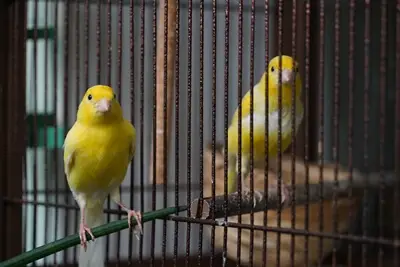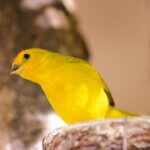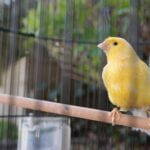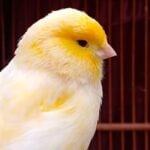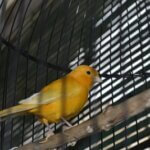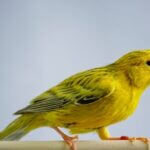Aggression isn’t a conscious decision canaries make but a response to things beyond their control, such as factors that scare and threaten them, past trauma, or illness/disease.
Canaries rarely bite, and they’re far more prone to “beaking,” which is a non-aggressive behavior.
It occurs when a canary wraps its beak around your fingers to move or examine your hand, often to check its strength. Your canary may also examine your hand’s texture, taste, and shape.
If your canary bites, it’ll do so by biting down hard. This is often paired with flapping wings, loud vocalizations, and hissing. A canary will only resort to this when it feels cornered or vulnerable.
A bite doesn’t mean your canary is aggressive; it may feel scared or threatened. However, biting can signify aggression if the canary has been defending a spot or making dominant gestures toward you.
Why Is My Canary Suddenly Aggressive?
Before treating aggression in a canary, you need to understand the root cause. Here are the reasons why a canary can turn aggressive:
1/ Earlier Traumatic Experiences
Sudden aggression may be a trauma response, especially when there isn’t another reason. For example, a canary may be scared of certain noises, even if it isn’t loud.
The noise of a spray bottle may remind it of cleaning products in a vet’s office while it was recovering from surgery. Or, this might remind it of being disproportionately punished by a previous owner.
Even seeing an object that reminds your canary of a traumatic experience may cause it to lash out.
If your canary is already mature or nearing maturity, it may have been mistreated or neglected by its previous owners. These behaviors can be retrained, but you might need the help of an animal behaviorist.
2/ Scared
Canaries may be scared of you, other animals, or new experiences. For example, moving to a new home can make a canary frightened of its surroundings.
Even poor socialization will make a canary prone to fear. It’ll feel uncomfortable around people, no matter how familiar. If your canary is scared, it’ll:
- Pull its feathers close to itself
- Pick feathers
- Make loud vocalizations
If you notice these actions, remove stressors and try to appear less threatening. If your canary continues to be scared, it may scratch and bite.
3/ Threatened
Canaries that are directly threatened will become aggressive and lash out in defense.
If a large pet jumps at its cage, it hears something loud or heavy fall near it, or you accidentally mishandle the bird, these all count as threats.
This is made worse if your canary has a cage mate. Your other bird may steal or guard food and toys or chase your canary off its perches. These can escalate into fights that turn vicious.
You should limit your canary’s exposure to direct threats and consider isolating it from other animals.
4/ Stressed
Stressed canaries can become aggressive, with the level of hostility rising. The causes of stress may be subtle or obvious, such as with:
- A small cage: Canaries need a cage at least 18 x 24 x 18 inches. A long cage is preferred as it allows hopping from perch to perch.
- Lack of food or nutrition: Canaries should be given high-quality seeds and pellets supplemented by fresh veggies, leafy greens, and fruits.
- Dirty environment: Canaries self-groom and love cleanliness. If the environment is dirty, canaries become stressed and vulnerable to developing an illness.
- Loud or distracting environment: Canaries prefer spaces that are calming. Don’t place your canary’s cage in an area of the house with a lot of foot traffic and loud noises.
- Other animals: Canaries dislike cage mates or any contact with animals that are larger than themselves. Keep your dog or cat away from the bird’s cage.
- Lack of mental stimulation: Canaries don’t require as much attention as other birds but still need mental stimulation. This can be through toys, exercising, watching TV, or listening to music.
5/ Fighting Over Territory
Unlike other members of the finch family, canaries aren’t social birds; they like company but prefer ample space between them and that company.
Canaries are territorial and become aggressive when that territory is threatened, even by a familiar cage mate. Putting two canaries in one enclosure outside breeding season usually leads to fighting, chasing, or even self-destructive behaviors.
Canaries may also become territorial against you, usually when hormones trigger it. That makes it wise to give your canary space and avoid reaching into its cage more than necessary.
You can tell your canary is feeling protective of its space when it:
- Opens its wings
- Squawks loudly
- Blocks you or your hand
6/ Puberty
Canaries that reach puberty might become irritable, angry, and aggressive.
Hormones affect a canary’s brain chemistry, changing behavior and personality alike. Thankfully, this extreme aggression isn’t permanent.
Canaries become sexually mature in late winter when they’re about 8-12 months old.
Around this time (especially during spring breeding season), they can become more hostile than usual. This behavior may come back every breeding season, but it should lessen as the years go on.

7/ Breeding Season
Mating is paired with aggression in many animals, including birds. Canaries are biologically wired to pass on their genes, and aggression is a tool to ensure that happens.
Hostile behavior drives off rivals and secures mates as their own. Likewise, females protect their nests and eggs to keep other canaries or small birds from interfering.
According to PloS One, wild male canaries are known to court birds other than their mate, becoming aggressive when their mate watches.
Even if your canary doesn’t have a partner, it can become mean during the breeding season if it’s been allowed to enter “condition.”
Too much light, access to nesting materials, and similar factors can lead a solitary bird to engage in mating behaviors, even without a mate.
Female Canary Attacking The Male
Male canaries are often more territorial than females. However, females can be aggressive toward people, pets, other females, and male canaries. The most common reasons include the following:
- Not wanting to breed: Canaries not in breeding condition will refuse to mate. They may fight back against males, although males are often more aggressive due to hormones.
- Lack of resources: If canaries lack food, water, or enrichment, they’ll fight for and guard resources.
- Territorial: Canaries are solitary creatures, so they guard their territory against other canaries.
Can Canaries Kill Each Other?
Canaries aren’t social by nature. Veterinarians and breeders recommend keeping canaries separate unless you’re breeding them. Only then can you put them in the same cage, and only during the mating season.
If you mix canaries outside this time and for another purpose, there’s a high chance of fighting. This is true even if they have been introduced correctly; sometimes, males fight males to the death.
Another life-threatening situation is when a male wants to breed, and the female rejects his advances or is not in breeding condition. In this situation, males can end up killing females.
Although less aggressive, females can start fights and may injure other birds. However, loss of life is rare.
It’s sensible to show caution and house your canaries individually, as this will prevent fighting and allow them to socialize at a distance through singing and other vocalizations.

